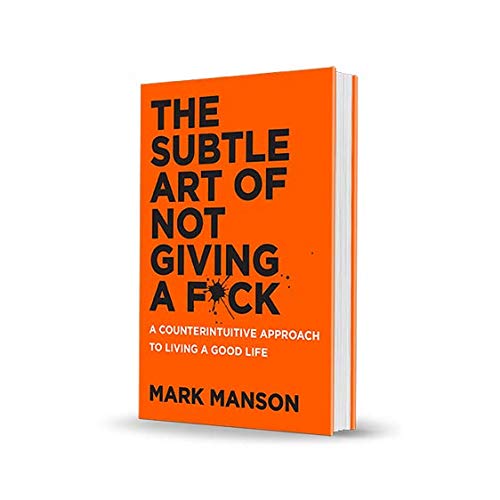📚 The Subtle Art of Not...

Book Title
The Subtle Art of Not Giving a F*ck
(non-fiction | self-help)
Author
Mark Manson
Review
I was at my friend’s cottage in the summer of 2019 when I first encountered this book.
The bluntness of the title really caught my attention.
So I decided to read it, three years later.
What I really liked about this book was how straightforward the author was when expressing his thoughts.
In his chapter, “The Self-Awareness Onion”, Mark Manson talks about the importance of the metrics that we use when evaluating progress towards our values. He persuades the reader to re-evaluate their perspective, as poor metrics that are hard to maintain could lead to constant feelings of incompetency.
“What is objectively true about your situation is not as important as how you come to see the situation, how you choose to measure it, and value it.”
As an example, he mentions how it is important to him that he keeps a good relationship with his brother. However, the metric of consistently calling or texting his brother as a measure of progress towards this value could easily ruin his day if it is not achieved. He suggests that a better metric to assess his relationship is to simply look for mutual trust and mutual respect when they do interact.
As well, Mark Manson is able to drill an idea into the reader’s brain through witty remarks:
“Parkinson’s law: ‘Work expands so as to fill up the time available for its completion.’
[…] Murphy’s law: ‘Whatever can go wrong will go wrong.’
[…] Manson’s law of avoidance: The more something threatens your identity, the more you will avoid it.
[…] This is why people are often so afraid of success - for the exact same reason they’re afraid of failure:
it threatens who they believe themselves to be.”
“In this way, ‘knowing yourself’ or ‘finding yourself’ can be dangerous.
It can cement you into a strict role and saddle you with unnecessary expectations”
The idea that Mark is drilling is open-mindedness.
This next sentence talks about killing your ego and measuring yourself by more simple identities:
“The narrower and rarer the identity you choose for yourself, the more everything will seem to threaten you.
For that reason, define yourself in the simplest and most ordinary ways possible.”
This hit true for me, as everytime I believed myself to have ‘extraordinary talent’,
my sense of entitlement brought upon extra stress and anxiety - especially if I failed to meet the goals that I set for myself.
Similar to a quote I read online - this doesn’t mean that I should think less of myself, it’s just that I should think of myself less.
I still set goals, but without the added pressure of living up to my own glorious egotistic expectations.
And by goals, this next passage nails the importance of growth-driven goals:
“For instance, if I measure myself by the standard ‘Make everyone I meet like me,’ I will be anxious, because failure is 100 percent defined by the actions of others, not by my own actions. I am not in control; thus my self worth is at the mercy of judgements by others.”
“Better values … are process-oriented. Something like ‘Express myself honestly to others,’ a metric for the value ‘honesty,’ is never completely finished; it’s a problem that must continuously be reengaged.’
So yeah, I definitely recommend this book as it delivers self-help concepts in witty, easy-to-read sentences with real life examples.
-수완-